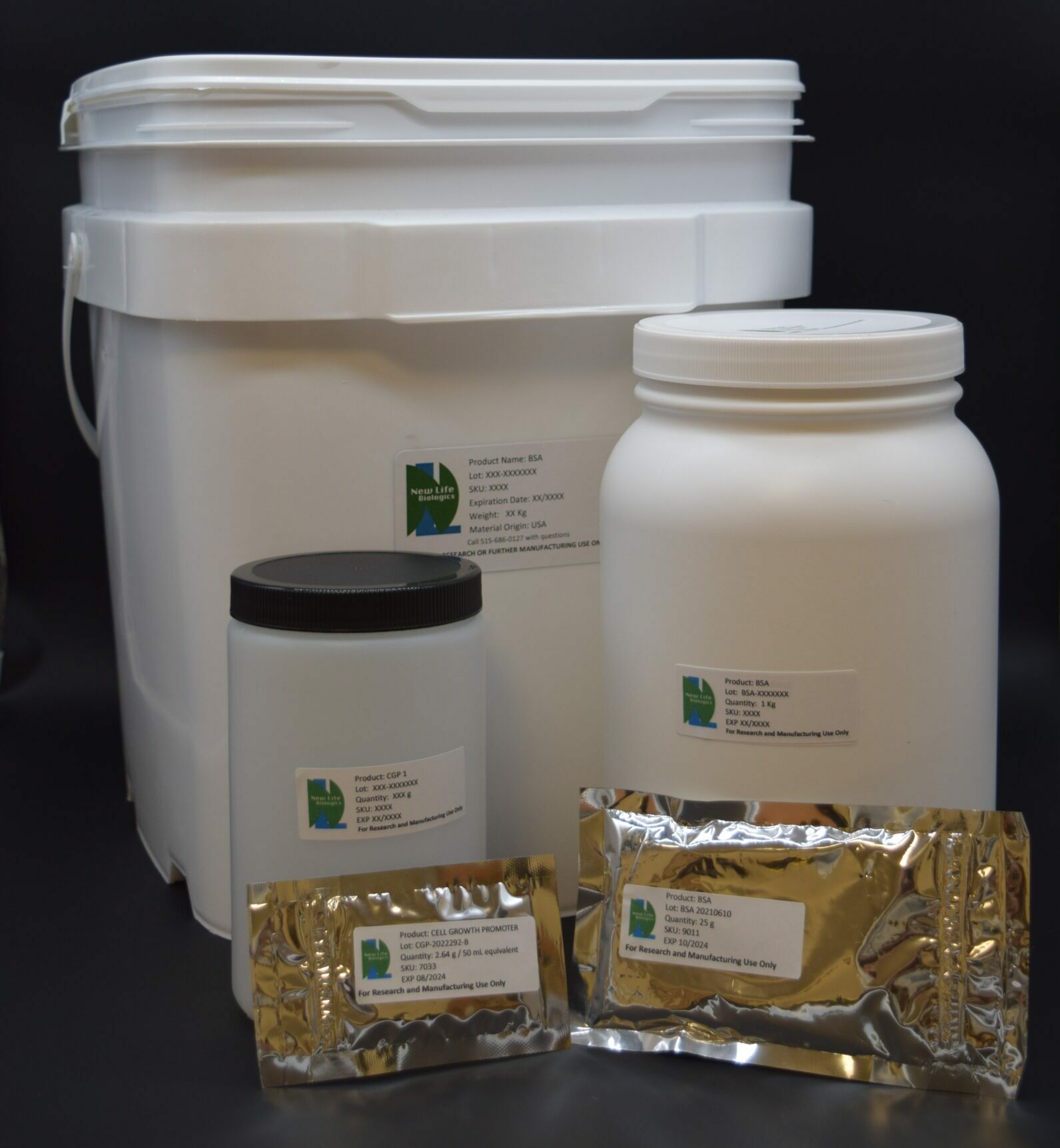Bovine Serum Albumin (BSA)
A Versatile Tool in Cell Culture and Biotech
Bovine Serum Albumin (BSA) is a protein isolated from the blood of cattle. It’s a highly soluble and stable protein, making it a valuable tool in various biological and biochemical applications. New Life Biologic’s BSA products are excellent alternatives to existing BSA products offering safety, stability, and are 100% sustainable.
Uses in Cell Culture
Protein Stabilizer:
BSA binds to hydrophobic surfaces, preventing proteins from denaturing and aggregating. This is particularly important in cell culture, where proteins like growth factors and enzymes can be sensitive to denaturation.
Protein Carrier:
BSA can act as a carrier protein, facilitating the transport of hydrophobic molecules across cell membranes and is useful for delivering drugs, hormones, or bioactive substances to cells.
Media Supplement:
BSA is often added to cell culture media to provide essential nutrients and support cell growth and proliferation.
Blocking Agent:
In immunohistochemistry and ELISA, BSA can be used to block nonspecific binding sites, reducing background noise and improving the sensitivity of assays.


Uses in Biotech Applications
Protein Purification:
BSA can be used as a carrier protein during protein purification, helping to stabilize proteins and prevent their loss during chromatography or dialysis.
Nanotechnology:
BSA can be used to stabilize nanoparticles and prevent their aggregation.
Drug Delivery:
BSA can be conjugated with drugs to improve their solubility, stability, and delivery to target tissues.
Product Comparison
Key Advantages & Benefits
Our BSA products were developed to tackle new challenges in biotechnology for a smarter, more sustainable future. New Life Biologics is proud to be at the frontier of this change, using proprietary technology, to develop improved biological products from concept to cutting-edge breakthroughs.
Increased Homogeneity:
Increased homogeneity in Bovine Serum Albumin (BSA) refers to a higher degree of uniformity or consistency in its properties. Our purification methods, manufacturing processes and quality controls are attributed to our increased homogeneity. This means that the BSA molecules within a particular sample are more similar to each other in terms of: Molecular weight, Purity, Post-translational Modifications, and Conformation.
Benefits:
- Improved reproducibility: More consistent BSA can lead to more reproducible results in experiments.
- Reduced variability: Lower variability in BSA can help to minimize background noise and improve the sensitivity of assays.
- Enhanced performance: Homogeneous BSA can perform better in specific applications, such as protein purification.
Safer BSA with Recognized Viral Kill Steps:
This refers to Bovine Serum Albumin that has undergone specific treatments or processes to reduce or eliminate the risk of viral contamination. By undergoing these treatments, BSA products can be made safer for use in sensitive applications, such as cell culture or in vivo studies.
Benefits:
- Improved Safety: This process helps to reduce the risk of viral transmission and improve the overall safety of the product.
- Best Practices: Choosing BSA Products that are labeled as “safer” or have undergone recognized viral kill steps ensures the highest level of safety for your applications.
FAQs
BSA is available in different grades based on its purity and intended use. Higher-purity grades are often used in sensitive applications, while lower-grade BSA may be suitable for less demanding applications.
Yes, BSA can be used as a protein standard to determine protein content
Yes, BSA can be used to stabilize nanoparticles and prevent their aggregation.
BSA is generally considered safe for laboratory use.



